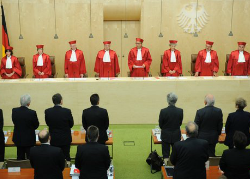
(New York Times)
At 10 a.m. Wednesday, Germany’s Federal Constitutional Court approved Chancellor Angela Merkel’s proposal to support the bailout plan for the 17 countries in the euro zone: the European Stability Mechanism (“E.S.M.”). The ESM, a continental version of the International Monetary Fund, will handle bailouts and work with the European Central Bank to buy the bonds of countries such as Italy and Spain who are struggling to sell bonds otherwise due to high interest rates. The Court ruled that Germany could proceed with its contribution to ESM, but limited the contribution to 190 billion euro, which is equivalent to $240 billion of the total $644 billion contributed so far. The Court also required parliamentary approval before it could provide any more. The contribution encouraged investors, with euro zone stocks rising 1.1% in the morning, reaching the highest point since March, 2012.
Mr. Vosskuhle, the Court’s president, explained after the decision, “[o]ne thing is clear: Only as a democratically legitimized community under the rule of law does Europe have a future.” The Court’s decision is just one more step for Europe beyond a common monetary policy and into encouraging its core group of countries to develop a more unified fiscal policy as well.
However, Spain is not so keen on this gift from Germany. Prime Minister Mariano Rajoy, who won a landslide victory in Spain last year, stated that he would refuse a bailout that is accompanied by strict terms. The Prime Minister stated, “I couldn’t accept anyone else telling us what our policies should be or where we have to make cuts.” Faced with two regional elections in October, Rajoy is putting on a strong front, refusing to give in to the ESM’s demands. The question is, are Spanish voters, faced with 25% unemployment and two years of recession, ready to handle further economic discipline. But with 20 billion euros in Spanish bonds due in October, Mr. Rajoy will have to seek assistance to help cover at least half the government’s 180 billion euro financing needs over the next year.
Angela Merkel and the ESM are essentially bringing Europe under one fiscal blanket. With disgruntled voters and a strong willed Prime Minister, Spain’s future is looking somewhat bleak. While the ESM has high hopes to see Europe with fiscal unification, Spain is attempting to be more independent and move away from the democratic ideal.
Mimi Faller is a 2L at DU Law, and a Staff Editor for the Denver Journal of International Law and Policy.


